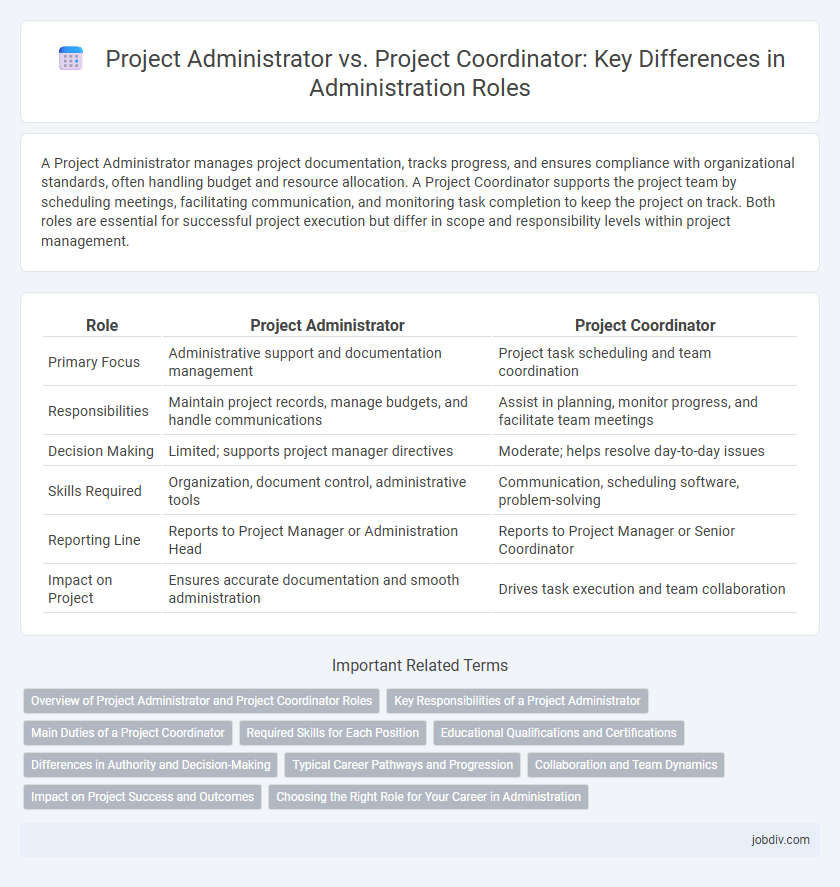A Project Administrator manages project documentation, tracks progress, and ensures compliance with organizational standards, often handling budget and resource allocation. A Project Coordinator supports the project team by scheduling meetings, facilitating communication, and monitoring task completion to keep the project on track. Both roles are essential for successful project execution but differ in scope and responsibility levels within project management.
Table of Comparison
| Role | Project Administrator | Project Coordinator |
|---|---|---|
| Primary Focus | Administrative support and documentation management | Project task scheduling and team coordination |
| Responsibilities | Maintain project records, manage budgets, and handle communications | Assist in planning, monitor progress, and facilitate team meetings |
| Decision Making | Limited; supports project manager directives | Moderate; helps resolve day-to-day issues |
| Skills Required | Organization, document control, administrative tools | Communication, scheduling software, problem-solving |
| Reporting Line | Reports to Project Manager or Administration Head | Reports to Project Manager or Senior Coordinator |
| Impact on Project | Ensures accurate documentation and smooth administration | Drives task execution and team collaboration |
Overview of Project Administrator and Project Coordinator Roles
Project Administrators oversee project planning, resource allocation, and budget management to ensure successful project delivery. Project Coordinators support project teams by managing schedules, facilitating communication, and tracking progress against milestones. Both roles are essential for efficient project execution, with Administrators focusing on strategic oversight and Coordinators handling operational details.
Key Responsibilities of a Project Administrator
A Project Administrator manages project documentation, schedules meetings, and ensures timely communication between stakeholders to maintain project alignment. They oversee budget tracking, resource allocation, and compliance with organizational policies to support project objectives effectively. Their role includes generating progress reports and coordinating administrative tasks to facilitate smooth project execution.
Main Duties of a Project Coordinator
A Project Coordinator primarily manages project schedules, tracks progress, and facilitates communication among team members to ensure timely task completion. They maintain documentation, organize meetings, and assist in resource allocation to support project objectives. Their role centers on coordinating operational activities rather than strategic decision-making, distinguishing them from Project Administrators.
Required Skills for Each Position
Project Administrators require strong organizational skills, proficiency in project management software, and the ability to manage budgets and schedules effectively. Project Coordinators need excellent communication skills, multitasking abilities, and experience in supporting project teams by tracking progress and coordinating resources. Both roles demand attention to detail and problem-solving capabilities, but administrators focus more on strategic planning while coordinators emphasize day-to-day operational support.
Educational Qualifications and Certifications
Project Administrators typically hold a bachelor's degree in business administration, project management, or a related field, often enhanced by certifications such as PMP (Project Management Professional) or CAPM (Certified Associate in Project Management). Project Coordinators generally have a diploma or associate degree with foundational knowledge in project processes, and certifications like CAPM or Microsoft Project Specialist improve their practical competencies. Both roles benefit from continuous professional development, with Project Administrators emphasizing strategic certifications aligned with complex project oversight.
Differences in Authority and Decision-Making
Project Administrators typically hold greater authority, overseeing project planning, resource allocation, and high-level decision-making, while Project Coordinators manage day-to-day operations and facilitate communication among team members. The Project Administrator's role often involves setting strategic priorities and approving project changes, whereas the Project Coordinator focuses on ensuring tasks align with established plans and timelines. This distinction highlights the Project Administrator's responsibility for overall project governance and the Project Coordinator's role in operational execution.
Typical Career Pathways and Progression
Project Administrators often begin their careers in entry-level administrative roles, progressing to specialized project support positions through gaining expertise in project management tools and methodologies. Project Coordinators typically advance by developing strong communication and organizational skills, eventually moving into project management or senior coordination roles overseeing multiple projects. Both pathways emphasize increasing responsibility, leadership capabilities, and proficiency in resource allocation, budgeting, and stakeholder management.
Collaboration and Team Dynamics
Project Administrators oversee resource allocation and strategic planning, ensuring seamless collaboration across departments to achieve project milestones. Project Coordinators facilitate communication between team members, track progress, and address day-to-day operational challenges to maintain workflow efficiency. Both roles enhance team dynamics by fostering accountability and supporting effective information exchange, crucial for project success.
Impact on Project Success and Outcomes
Project Administrators play a crucial role in defining project scope, managing budgets, and ensuring resource allocation aligns with strategic goals, directly influencing overall project success and delivery timelines. Project Coordinators focus on day-to-day task management, communication facilitation, and scheduling, which improves team collaboration and keeps projects on track. Effective integration of both roles enhances project outcomes by balancing strategic oversight with operational execution.
Choosing the Right Role for Your Career in Administration
Project Administrators oversee project planning, resource allocation, and stakeholder communication, aligning project goals with organizational objectives. Project Coordinators focus on supporting project teams through scheduling, documentation, and task tracking, ensuring smooth day-to-day operations. Choose a Project Administrator role for strategic leadership opportunities, while a Project Coordinator position suits those excelling in detailed organization and team support within administrative careers.
Project Administrator vs Project Coordinator Infographic

 jobdiv.com
jobdiv.com